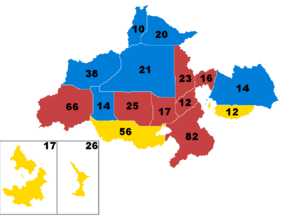2001 Soltenish Presidential Election
| |||||||||||||||||||||||||||||||||||||
469 votes up for election 235 votes needed to win | |||||||||||||||||||||||||||||||||||||
|---|---|---|---|---|---|---|---|---|---|---|---|---|---|---|---|---|---|---|---|---|---|---|---|---|---|---|---|---|---|---|---|---|---|---|---|---|---|
| Registered | 104,456,871 ( | ||||||||||||||||||||||||||||||||||||
| Turnout | 79,608,999 (76.2%) ( | ||||||||||||||||||||||||||||||||||||
| |||||||||||||||||||||||||||||||||||||
 Republics won by Girardino DaCareza
Republics won by Mario Boriello Republics won by Erik Schmidt | |||||||||||||||||||||||||||||||||||||
| |||||||||||||||||||||||||||||||||||||
The 2001 Soltenish presidential election was the 5th sexennial presidential election held in Soltenia. The election was held on Wednesday, July 11, 2001. Acting president Girardino DaCareza of the Republican Party, representing the United Left alliance, won a narrow victory against Conservative Union candidate and former premier of Orenza, Mario Boriello and New Confederalist and special prosecutor Erik Schmidt of Fernerland. DaCareza won a plurality of the popular vote and a majority of the delegate vote, taking 38.4% of the popular vote, 5.2% ahead of second-place Boriello, and 241 delegates, just over the 235 needed to win. This election marked the end of the domination of politics by the Conservative Union and Confederalist parties (with the Confederalists splitting into three factions) and the first of three consecutive victories for the United Left from 2001-19.
DaCareza ascended to the presidency when Olaf Berolder was removed from office in the wake of a vote-buying scandal, which badly damaged the Conservatve Union and its electoral prospects. Since the position of Chief Minister was absent, as Chair of the Senate DaCareza was sworn in as acting president. DaCareza governed as a caretaker and promised to continue prosecution of corruption political agenda and govern as a moderate liberal if elected for a full term of his own. DaCareza faced no signifigant challenges for his nomination. Boriello, a premier of Orenza, came from the relatively conservative outsider wing of his party, citing his successful tenure in Orenza and his status as a Carez outsider. The young New Confederalist party, one of the larger factions from the de facto dissolution of the Confederalists in the late 1990s, nominated Schmidt, who had served the prosecutor of Berolder and was the incumbent attorney-general of Fernerland.
The campaign primarily centered around political corruption, rising crime, and the brief economic recession that had begun in December 1999 (and would last until November of 2001). DaCareza emphasized his steady leadership in wake of the political crises of the late 90s and many of his campaign ads centered around making him out to be a "savior" of the Soltenish political process. In addition, DaCareza called out his political opponents for hampering the passage of several economic stimulus bills. In contrast to DaCareza's message of a "steady hand", the Both Boriello and Schmidt sought to label DaCareza as a creature of the Senate who had been in national politics for 20 years and was connected to the highly disliked Senate. However, while Boriello advertised himself as a "return to normalcy" and the pre-scandal political factions while Schmidt ran as a populist and tough-on-crime reformer who would clean the Senate of corruption and use the presidency's powers to remake Soltenish political discourse. In particular, Schmidt found high support among ethnic minorities and in republics dominated by non-Soltenish groups. Privately, Schmidt did not believe he had a chance to win the election outright, and instead he wished for the election to become deadlocked- a scenario where he could present himself as a compromise candidate.
Schmidt won 27.0% of the popular vote, the highest share of the vote won by a candidate outside of the two major political groups since the start of Soltenish democracy. These votes were concentrated among ethnic minorities, carrying him to victory in Fernerland, Culmia, Irassia, and the Suregni Islands. Outside of these republics, Schmidt had at least some support nationwide, resulting in no republic giving an absolute majority to any candidate except DaCareza's home republic of Almarence. DaCareza's victory primarily came from strong support from urban voters, his hold on Almarentine politics (Almarence giving over 34% of DaCareza's delegates), and his ability to attract a greater number of former Confederalists than either Schmidt or Boriello was able to. As of 2024, this is the last time either candidate from the two major parties received less than 40% of the vote.


